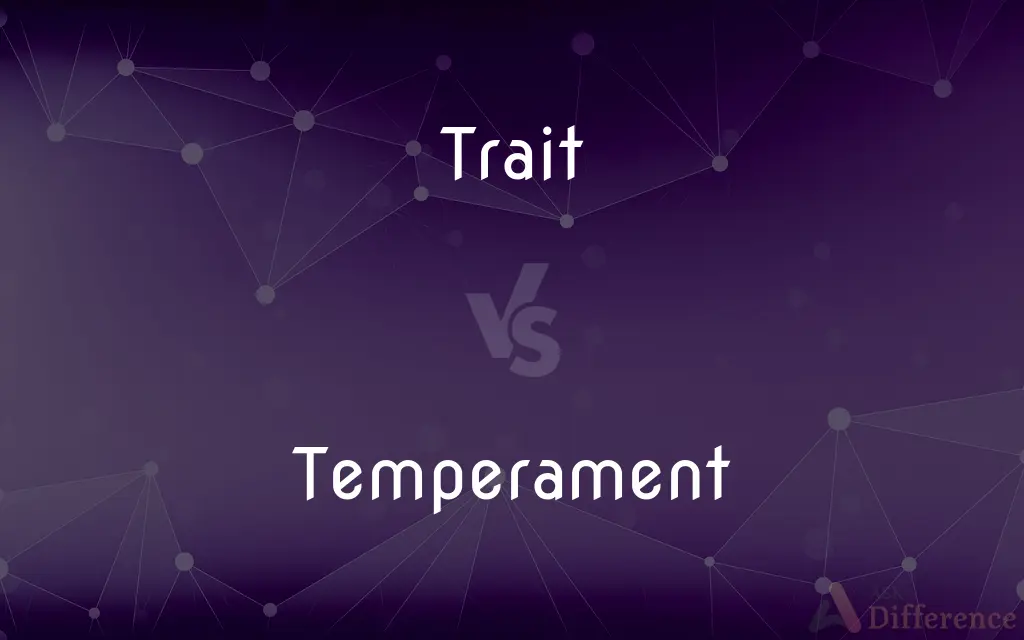Trait vs. Temperament — What's the Difference?

Difference Between Trait and Temperament
ADVERTISEMENT
Compare with Definitions
Trait
A distinguishing quality or characteristic, typically one belonging to a person
The traditionally British trait of self-denigration
Temperament
In psychology, temperament broadly refers to consistent individual differences in behavior that are biologically based and are relatively independent of learning, system of values and attitudes. Some researchers point to association of temperament with formal dynamical features of behavior, such as energetic aspects, plasticity, sensitivity to specific reinforcers and emotionality.
Trait
A distinguishing feature, as of a person's character.
Temperament
A person's or animal's nature, especially as it permanently affects their behaviour
She had an artistic temperament
Trait
A morphological, physiological, or behavioral feature of an organism.
ADVERTISEMENT
Temperament
The adjustment of intervals in tuning a piano or other musical instrument so as to fit the scale for use in different keys; in equal temperament, the octave consists of twelve equal semitones
This temperament became standard tuning for all the new organs
Trait
(Archaic) A short line or mark made with a writing or drawing implement.
Temperament
The manner of thinking, behaving, or reacting characteristic of a specific person
A nervous temperament.
Trait
An identifying characteristic, habit or trend.
The number one personality trait I hate is hypocrisy. Why can't you be consistent!?
Temperament
The distinguishing mental and physical characteristics of a human according to medieval physiology, resulting from dominance of one of the four humors.
Trait
(object-oriented) An uninstantiable collection of methods that provides functionality to a class by using the class’s own interface.
Traits are somewhat between an interface and a mixin.
Temperament
Excessive irritability or sensitiveness
An actor with too much temperament.
Trait
A stroke; a touch.
By this single trait Homer makes an essential difference between the Iliad and Odyssey.
Temperament
(Music) See equal temperament.
Trait
A distinguishing or marked feature; a peculiarity; as, a trait of character.
Temperament
A person's usual manner of thinking, behaving or reacting.
Trait
A distinguishing feature of your personal nature
Temperament
A tendency to become irritable or angry.
Temperament
(music) The altering of certain intervals from their correct values in order to improve the moving from key to key.
Temperament
(psychology) Individual differences in behavior that are biologically based and are relatively independent of learning, system of values and attitudes.
Temperament
(obsolete) A moderate and proportionable mixture of elements or ingredients in a compound; the condition in which elements are mixed in their proper proportions.
Temperament
(obsolete) Any state or condition as determined by the proportion of its ingredients or the manner in which they are mixed; consistence, composition; mixture.
Temperament
Internal constitution; state with respect to the relative proportion of different qualities, or constituent parts.
The common law . . . has reduced the kingdom to its just state and temperament.
Temperament
Due mixture of qualities; a condition brought about by mutual compromises or concessions.
However, I forejudge not any probable expedient, any temperament that can be found in things of this nature, so disputable on their side.
Temperament
The act of tempering or modifying; adjustment, as of clashing rules, interests, passions, or the like; also, the means by which such adjustment is effected.
Wholesome temperaments of the rashness of popular assemblies.
Temperament
Condition with regard to heat or cold; temperature.
Bodies are denominated "hot" and "cold" in proportion to the present temperament of that part of our body to which they are applied.
Temperament
A system of compromises in the tuning of organs, pianofortes, and the like, whereby the tones generated with the vibrations of a ground tone are mutually modified and in part canceled, until their number reduced to the actual practicable scale of twelve tones to the octave. This scale, although in so far artificial, is yet closely suggestive of its origin in nature, and this system of tuning, although not mathematically true, yet satisfies the ear, while it has the convenience that the same twelve fixed tones answer for every key or scale, C$ becoming identical with D$, and so on.
Temperament
The peculiar physical and mental character of an individual, in olden times erroneously supposed to be due to individual variation in the relations and proportions of the constituent parts of the body, especially of the fluids, as the bile, blood, lymph, etc. Hence the phrases, bilious or choleric temperament, sanguine temperament, etc., implying a predominance of one of these fluids and a corresponding influence on the temperament.
Temperament
Your usual mood;
He has a happy disposition
Temperament
Excessive emotionalism or irritability and excitability (especially when displayed openly)
Temperament
An adjustment of the intervals (as in tuning a keyboard instrument) so that the scale can be used to play in different keys
Share Your Discovery

Previous Comparison
Circle vs. Dot
Next Comparison
Anorexia vs. Fasting














































